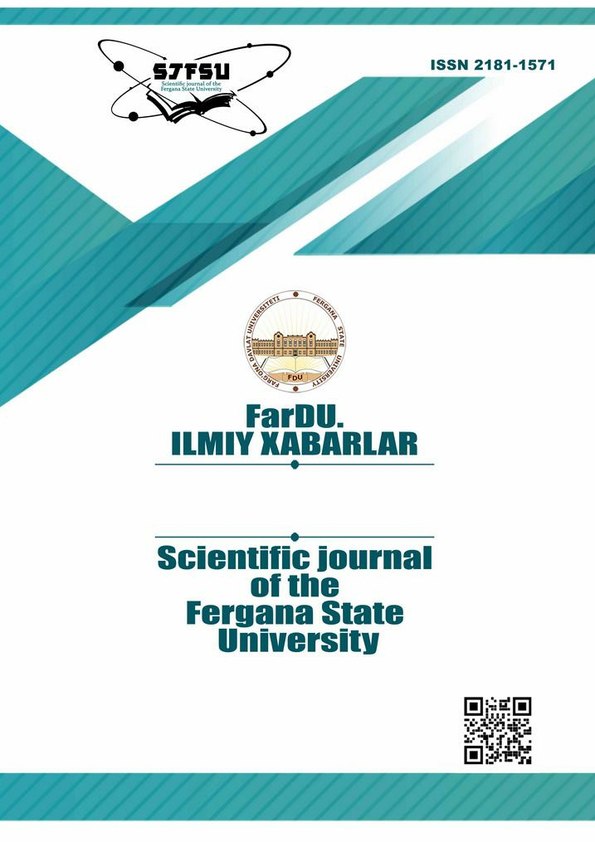METHODOLOGY AND ORGANIZATION OF TEACHING THE RUSSIAN LANGUAGE AT A TECHNICAL UNIVERSITY
Keywords:
language education, cognitive abilities, building knowledge, foreign language, methodological approachesAbstract
Uzbekistan is constantly expanding cooperation in the field of education, including joint training with foreign educational institutions. Interest in the Russian language in our country is growing: more and more Uzbek youth are striving to learn it. At present, the global goal of mastering the Russian language is the opportunity to participate in the dialogue of cultures. At the same time, it is not just about knowing the language, but about the ability to use it in real communication, that is, about practical knowledge of the language. In this regard, the following aspects are considered in the article features of teaching Russian language to students of technical universities, organization of teaching the Russian language in a functional context; basic principles of teaching Russian as a foreign language; the main methodological approaches to teaching students in the context of the form of organization of their knowledge; increasing the intellectual and general cultural level of students' knowledge in the study of the Russian language; the possibility of improving the form of organization of knowledge in teaching students.
References
Ахмедов Г.И., Магомедова Т.И. Русский язык в контексте мультилингвизма: компетентностная парадигма обучения // Наука. Мысль. 2015. № 11. С. 15-19. (Akhmedov G.I., Magomedova T.I. Russian language in the context of multilingualism: competency-based learning paradigm // Nauka. Thought. 2015. No. 11. P. 15-19.)
Баракатова, Д. А., Нурмурадова, Ш. И., & Солиева, М. А. (2016). Социально-психологическое обеспечение педагогического воздействия на учащихся. Молодой ученый, (12), 816-818. https://elibrary.ru/item.asp?id=26423314 (Barakatova, D. A., Nurmuradova, Sh. I., & Solieva, M. A. (2016). Socio-psychological support of pedagogical influence on students. Young Scientist, (12), 816-818.)
Глухов Б.А., Щукин А.Н. Термины методики преподавания русского языка как иностранного. — М: Русский язык, 1993. — 371 с. (Glukhov B.A., Shchukin A.N. Terms of the methodology of teaching Russian as a foreign language. - M.: Russian language, 1993. — 371 p.)
Зимняя И.А. Лингвопсихология речевой деятельности. — М.: Московский психолого-социальный ин-т, 2001, С.145-184. (Zimnyaya I.A. Linguistic psychology of speech activity. - M.: Moscow Psychological and Social Institute, 2001, pp.)
Карташёва А.Н., Кенжегалиева С.К. Самостоятельная работа студентов 145-184
национальных групп при обучении чтению текстов с национально-культурным компонентом // Дидактическая филология. 2016. №4. С. 41-49.( Kartasheva A.N., Kenzhegalieva S.K. Independent work of students of national groups in teaching reading texts with a national-cultural component // Didactic philology. 2016. No. 4. pp. 41-49.)
Насирова Д.М., Ачилова М.Р. Роль информационных и коммуникационных технологий в обучении иностранным языкам // Вестник по педагогике и психологии Южной Сибири. 2014. № 1. С. 53-57.( Nasirova D.M., Achilova M.R. The role of information and communication technologies in teaching foreign languages // Bulletin of Pedagogy and Psychology of Southern Siberia. 2014. No. 1. pp. 53-57.)
Нурмурадова, Ш. И. (2016). Формирование у студентов интереса к профессии учителя в процессе педагогической практики. Молодой ученый, (9), 1162-1163. https://elibrary.ru/item.asp?id=25964478. (Nurmuradova, Sh. I. (2016). Formation of students' interest in the teaching profession in the process of teaching practice. Young Scientist, (9), 1162-1163.)
Нурмурадова Ш.И. Инновационные педагогические технологии в вузе при подготовке специалистов // Вестник по педагогике и психологии Южной Сибири. 2014. №1. URL: https://cyberleninka.ru/article/n/innovatsionnye-pedagogicheskie-tehnologii-v-vuze-pri-podgotovke-spetsialistov(дата обращения: 20.02.2023).( Nurmuradova Sh.I. Innovative pedagogical technologies at the university in the preparation of specialists // Bulletin of Pedagogy and Psychology of South Siberia. 2014.)
Downloads
Published
Issue
Section
License
Copyright (c) 2023 Scientific journal of the Fergana State University

This work is licensed under a Creative Commons Attribution-NonCommercial-NoDerivatives 4.0 International License.
How to Cite
Most read articles by the same author(s)
- Шахноз Нурмурадова, METHODOLOGY AND ORGANIZATION OF TEACHING THE RUSSIAN LANGUAGE AT A TECHNICAL UNIVERSITY , Scientific journal of the Fergana State University: No. 1 (2023): Scientific journal of the Fergana State University (Exact and natural sciences)

